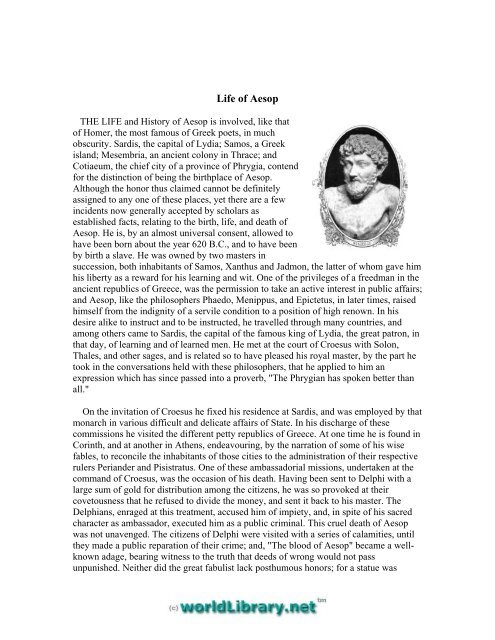- Page 1 and 2: Aesop’s FablesClassic Literature
- Page 3 and 4: World eBook LibraryThe World eBook
- Page 9 and 10: PREFACETHE TALE, the Parable, and t
- Page 11 and 12: Augustus to the honors of a freedma
- Page 13 and 14: owes his restoration to universal f
- Page 15 and 16: -1-The Wolf and the LambWOLF, meeti
- Page 17 and 18: -3-The Ass and the GrasshopperAN AS
- Page 19 and 20: -5-The Charcoal-Burner and the Full
- Page 22 and 23: -8-The Cock and the JewelA COCK, sc
- Page 24 and 25: -10-The Wolf and the CraneA WOLF wh
- Page 26 and 27: -12-Hercules and the WagonerA CARTE
- Page 28 and 29: -14-The Ants and the GrasshopperTHE
- Page 30 and 31: -16-The Mole and His MotherA MOLE,
- Page 32 and 33: -18-The Hare and the TortoiseA HARE
- Page 34 and 35: -20-The Farmer and the StorkA FARME
- Page 36 and 37: -22-The Fawn and His MotherA YOUNG
- Page 38 and 39: -24-The Swallow and the CrowTHE SWA
- Page 40 and 41: -26-The Ass, the Fox, and the LionT
- Page 42 and 43: -28-The Flies and the Honey-PotA NU
- Page 44 and 45: -30-The Farmer and the CranesSOME C
- Page 46 and 47: -32-The Fox and the GoatA FOX one d
- Page 48 and 49: -34-The Oxen and the Axle-TreesA HE
- Page 50 and 51: -36-The Raven and the SwanA RAVEN s
- Page 52 and 53: -38-The MiserA MISER sold all that
- Page 54 and 55: -40-The Horse and GroomA GROOM used
- Page 56 and 57:
-42-The LionessA CONTROVERSY prevai
- Page 58 and 59:
-44-The Cat and the CockA CAT caugh
- Page 60 and 61:
-46-The Boy and the FilbertsA BOY p
- Page 62 and 63:
-48-The Laborer and the SnakeA SNAK
- Page 64 and 65:
-50-The Ass and the MuleA MULETEER
- Page 66 and 67:
-52-The Boys and the FrogsSOME BOYS
- Page 68 and 69:
-54-The Salt Merchant and His AssA
- Page 70 and 71:
-56-The Lion, the Mouse, and the Fo
- Page 72 and 73:
-58-The Goatherd and the Wild Goats
- Page 74 and 75:
-60-The Fox Who Had Lost His TailA
- Page 76 and 77:
-62-The Man and His Two Sweethearts
- Page 78 and 79:
-64-The Wolves and the Sheep"WHY SH
- Page 80 and 81:
-66-The Fighting Cocks and the Eagl
- Page 82 and 83:
-68-The Fox and the MonkeyA MONKEY
- Page 84 and 85:
-70-The Belly and the MembersTHE ME
- Page 86 and 87:
-72-Jupiter and the MonkeyJUPITER I
- Page 88 and 89:
-74-The Shepherd's Boy and the Wolf
- Page 90 and 91:
-76-The Kid and the WolfA KID stand
- Page 92 and 93:
-78-The Shepherd and the WolfA SHEP
- Page 94 and 95:
-80-The Farmer and His SonsA FATHER
- Page 96 and 97:
-82-The Heifer and the OxA HEIFER s
- Page 98 and 99:
-84-The Thief and His MotherA BOY s
- Page 100 and 101:
-86-The Fir-Tree and the BrambleA F
- Page 102 and 103:
-88-The Man Bitten by a DogA MAN wh
- Page 104 and 105:
-90-The Wolf and the SheepA WOLF, s
- Page 106 and 107:
-92-The Fisherman and His NetsA FIS
- Page 108 and 109:
-94-The Old Woman and the Wine-JarA
- Page 110 and 111:
-96-The Two DogsA MAN had two dogs:
- Page 112 and 113:
-98-The Hawk, the Kite, and the Pig
- Page 114 and 115:
-100-The Wild Ass and the LionA WIL
- Page 116 and 117:
-102-The Sick KiteA KITE, sick unto
- Page 118 and 119:
-104-The Lion and the BoarON A SUMM
- Page 120 and 121:
-106-The Shepherd and the SeaA SHEP
- Page 122 and 123:
-108-The Mice and the WeaselsTHE WE
- Page 124 and 125:
-110-The Wolf and the HousedogA WOL
- Page 126 and 127:
-112-The Playful AssAN ASS climbed
- Page 128 and 129:
-114-The Master and His DogsA CERTA
- Page 130 and 131:
-116-The Dolphins, the Whales, and
- Page 132 and 133:
-118-The Two Travelers and the AxeT
- Page 134 and 135:
-120-The Old HoundA HOUND, who in t
- Page 136 and 137:
-122-The Milk-Woman and Her PailA F
- Page 138 and 139:
-124-The Brazier and His DogA BRAZI
- Page 140 and 141:
-126-The Ass and His MastersAN ASS,
- Page 142 and 143:
-128-The Fisherman and the Little F
- Page 144 and 145:
-130-The Wild Boar and the FoxA WIL
- Page 146 and 147:
-132-Mercury and the SculptorMERCUR
- Page 148 and 149:
-134-The Swollen FoxA VERY HUNGRY F
- Page 150 and 151:
-136-The Birdcatcher, the Partridge
- Page 152 and 153:
-138-The Flea and the WrestlerA FLE
- Page 154 and 155:
-140-The Cat and the MiceA CERTAIN
- Page 156 and 157:
-142-The Doe and the LionA DOE hard
- Page 158 and 159:
-144-The Seagull and the KiteA SEAG
- Page 160 and 161:
-146-The Mouse and the BullA BULL w
- Page 162 and 163:
-148-The Peasant and the EagleA PEA
- Page 164 and 165:
-150-The Bull and the GoatA BULL, e
- Page 166 and 167:
-152-The Fox and the LeopardTHE FOX
- Page 168 and 169:
-154-The Oaks and JupiterTHE OAKS p
- Page 170 and 171:
-156-The Traveler and FortuneA TRAV
- Page 172 and 173:
-158-The Shepherd and the DogA SHEP
- Page 174 and 175:
-160-The Lion, the Fox, and the Ass
- Page 176 and 177:
-162-The Oak and the WoodcuttersTHE
- Page 178 and 179:
-164-The Ass and the FrogsAN ASS, c
- Page 180 and 181:
-166-The Trees and the AxeA MAN cam
- Page 182 and 183:
-168-The Woman and Her HenA WOMAN p
- Page 184 and 185:
-170-The Kites and the SwansTHE KIT
- Page 186 and 187:
-172-The Hares and the FoxesTHE HAR
- Page 188 and 189:
-174-The CamelWHEN MAN first saw th
- Page 190 and 191:
-176-The Dog and the HareA HOUND ha
- Page 192 and 193:
-178-The Stag, the Wolf, and the Sh
- Page 194 and 195:
-180-The Fox and the HedgehogA FOX
- Page 196 and 197:
-182-The Thief and the InnkeeperA T
- Page 198 and 199:
-184-The Hart and the VineA HART, h
- Page 200 and 201:
-186-The Crow and the PitcherA CROW
- Page 202 and 203:
-188-The Wolf and the FoxAT ONE TIM
- Page 204 and 205:
-190-The Gnat and the LionA GNAT ca
- Page 206 and 207:
-192-The Jackdaw and the DovesA JAC
- Page 208 and 209:
-194-The Kid and the WolfA KID, ret
- Page 210 and 211:
-196-The Fox and the MonkeyA FOX an
- Page 212 and 213:
-198-The Man, the Horse, the Ox, an
- Page 214 and 215:
-200-The Wolf and the ShepherdA WOL
- Page 216 and 217:
-202-The Lark and Her Young OnesA L
- Page 218 and 219:
-204-The Weasel and the MiceA WEASE
- Page 220 and 221:
-206-The Ass and the WolfAN ASS fee
- Page 222 and 223:
-208-
- Page 224 and 225:
-210-The Peacock and JunoTHE PEACOC
- Page 226 and 227:
-212-The Dog, the Cock, and the Fox
- Page 228 and 229:
-214-The Lion and the BullA LION, g
- Page 230 and 231:
-216-The Town Mouse and the Country
- Page 232 and 233:
-218-The Fly and the Draught-MuleA
- Page 234 and 235:
-220-The Lion and the Three BullsTH
- Page 236 and 237:
-222-The Horse and the AssA HORSE,
- Page 238 and 239:
-224-The Geese and the CranesTHE GE
- Page 240 and 241:
-226-The Dogs and the FoxSOME DOGS,
- Page 242 and 243:
-228-The Wolf and the HorseA WOLF c
- Page 244 and 245:
-230-The Wasps, the Partridges, and
- Page 246 and 247:
-232-The North Wind and the SunTHE
- Page 248 and 249:
-234-The Gamecocks and the Partridg
- Page 250 and 251:
-236-The Lion, the Wolf, and the Fo
- Page 252 and 253:
-238-The Wolf and the LionROAMING B
- Page 254 and 255:
-240-The Spendthrift and the Swallo
- Page 256 and 257:
-242-The Owl and the BirdsAN OWL, i
- Page 258 and 259:
-244-The Ass in the Lion's SkinAN A
- Page 260 and 261:
-246-The Flea and the OxA FLEA thus
- Page 262 and 263:
-248-The Dove and the CrowA DOVE sh
- Page 264 and 265:
-250-The Eagle and the JackdawAN EA
- Page 266 and 267:
-252-Jupiter, Neptune, Minerva, and
- Page 268 and 269:
-254-The Man and the SatyrA MAN and
- Page 270 and 271:
-256-The Two BagsEVERY MAN, accordi
- Page 272 and 273:
-258-The Jackdaw and the FoxA HALF-
- Page 274 and 275:
-260-The Gnat and the BullA GNAT se
- Page 276 and 277:
-262-The Dogs and the HidesSOME DOG
- Page 278 and 279:
-264-The Grasshopper and the OwlAN
- Page 280 and 281:
-266-The Peasant and the Apple-Tree
- Page 282 and 283:
-268-The Trees Under the Protection
- Page 284 and 285:
-270-The Ass and the HorseAN ASS be
- Page 286 and 287:
-272-The ManslayerA MAN committed a
- Page 288 and 289:
-274-The Lion and the EagleAN EAGLE
- Page 290 and 291:
-276-The Buffoon and the Countryman
- Page 292 and 293:
-278-The Hunter and the HorsemanA C
- Page 294 and 295:
-280-The Cat and VenusA CAT fell in
- Page 296 and 297:
-282-The Camel and the ArabAN ARAB
- Page 298 and 299:
-284-The Crow and the SheepA TROUBL
- Page 300 and 301:
-286-The Wolf and the LionA WOLF, h
- Page 302 and 303:
-288-The Ant and the DoveAN ANT wen
- Page 304 and 305:
-290-The Flea and the ManA MAN, ver
- Page 306 and 307:
-292-The Dog and the CookA RICH MAN
- Page 308 and 309:
-294-The Hares and the FrogsTHE HAR
- Page 310 and 311:
-296-The Lamb and the WolfA WOLF pu
- Page 312 and 313:
-298-The Shipwrecked Man and the Se
- Page 314 and 315:
-300-The Viper and the FileA VIPER,
- Page 316 and 317:
-302-The Camel and JupiterTHE CAMEL
- Page 318 and 319:
-304-The Ass and the ChargerAN ASS
- Page 320 and 321:
-306-The Bald Man and the FlyA FLY
- Page 322 and 323:
-308-The Eagle and the KiteAN EAGLE
- Page 324 and 325:
-310-The Thrush and the FowlerA THR
- Page 326 and 327:
-312-
- Page 328 and 329:
NOTES1. A History of the Literature
- Page 330:
16. The claims of Babrias also foun







